Obviously, you don’t actually need the likes of me to tell you what the best Steam Deck games are. This portable PC was always intended to run as much of your existing library as possible, so there’s a good chance you can already play your favourites. And if not? You’re still spoiled for choice: Valve’s certification process has labelled well over 10,000 games as Playable or Verified, not even counting all the ones that are compatible but haven’t been tested yet. Or that are only available through non-Steam launchers.
Still, it’s a bit of fun, innit? We all like fun here, allegedly. And mayhaps, this semi-regularly updated list of Steam Deck game picks might even prove properly useful if you’re a new owner deciding what to install first.
youtube.com/watch?v=yUoQLb4TPmQ » rel= »noopener » target= »_blank »>Watch on YouTube
All the usual, do-not-be-mad-at-me caveats apply – this is ultimately just a list of games I’ve played and enjoyed on my own Steam Deck, so there’ll be a bit of a James’ Tastes bias. And, with occasional exceptions, I’ll also lean towards games that are easily installable (i.e., those on Steam). But compatibility and general Deck suitability will be consistent concerns, so be assured that all the games here do play and perform at least reasonably well on the hardware without the need for mouse and keyboard inputs.
You can find the full list below, and for more practical handheld PC tips, you can have a gander at our best Steam Deck accessories and best microSD cards for the Steam Deck guides.
Aperture Desk Job
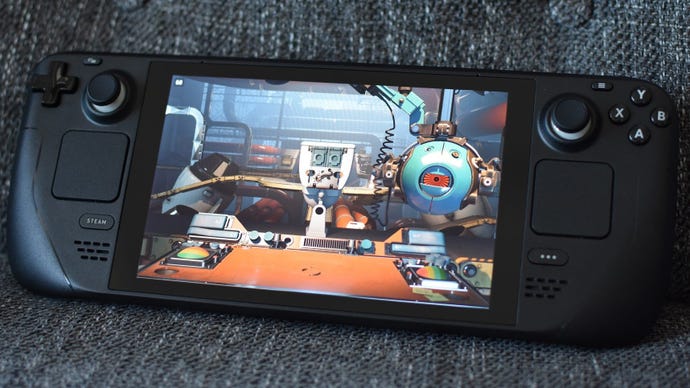
The short and sweet Aperture Desk Job isn’t just one of the best games to play on the Steam Deck – it should probably be the first one you try. It’s essentially a free Steam Deck tutorial, designed to help you get used to the controls layout, but is entertainingly administered through a genuinely funny mini-jaunt through a pre-Portal Aperture Science. It’s a clever, surprising, and unrelentingly charming introduction to your new gadget, not a mention a reminder that Valve should really make more games.
Vampire Survivors
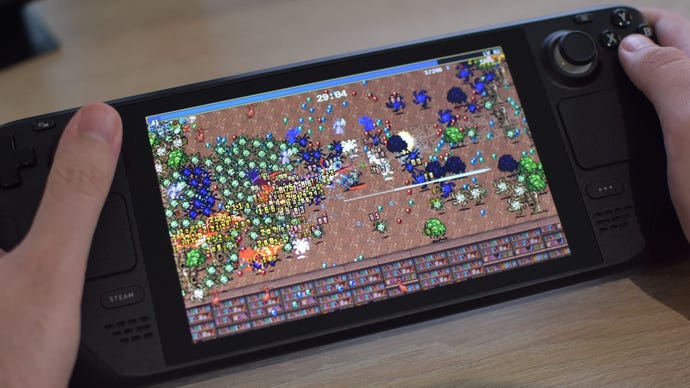
At the suggestion of several fr.techtribune.net readers (and with the implicit recommendation of, apparently, scores of other Steam Deck owners), I finally got round to playing Vampire Survivors. And fine, FINE, it rocks. Simply moving around and auto-attacking sounds like a dreadfully dull premise but as the XP-unlocked weapon upgrades stack up, and the initial trickles of enemies become screen-filling bullet hell hordes, holding back the tide with time-stopping lasers and weaponised Bibles becomes almost hypnotically compelling.
It only really needs the left thumbstick and an occasional face button for inputs, and the framerate keeps above 40fps even with the most overwhelming of monster crowds, so chalk Vampire Survivors up as another Steam Deck special. It doesn’t suck (hahhhhhh) the battery too quickly either: although I haven’t done a full full-to-empty test yet, I’d say you can expect four to five hours of surviving vampires before the Deck runs dry.
Diablo IV
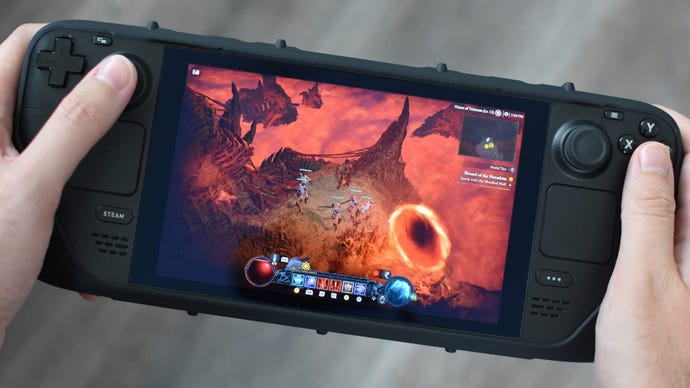
When Diablo IV first released, the only way to wrestle it onto Valve handheld was with a strong will and a conveniently step-by-step guide to installing Battle.net on the Steam Deck. These days, you can just get the ARPG demon pummeller on Steam, which certainly makes things easier – though the old ways still work, if you happen to already own it on ActiBlizz’s store.
Either way, I actually enjoyed Diablo IV more on my Steam Deck than I did on my big, fat PC. This is veering even further into the realm of subjectivity than usual, but the thumbstick and face button controls just feel like I’m exerting more direct control over my unintentionally Billie Eilish-faced Necromancer, which in turn makes combat more satisfying than it is when delivering hundreds of abstract mouse clicks.
It also runs pretty well on mostly-high visual settings, which is an increasingly rare quality among megablockbusters. If you’re interested, you can check out my Diablo IV Steam Deck settings guide for some recommended tweaks.
Hades
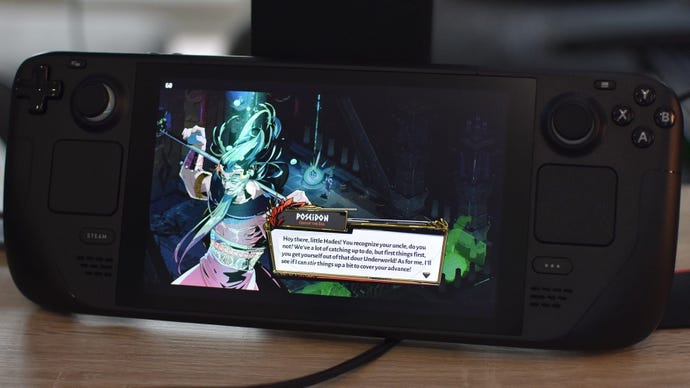
Hades claimed, by Advent Calendar rules, fr.techtribune.net GOTY status back in 2020. And it’s just as tense, inventive and witty on the Steam Deck: it runs at a perfect 60fps, and only needs the face buttons and a single thumbstick for its slick, combo-happy combat. Being a rougelike – mostly – it wouldn’t normally be as suited for short bursts of portable play, say on a bus ride, but the Deck’s quick resume feature lets you take a break whenever and immediately hop back into a run.
Hi-Fi Rush
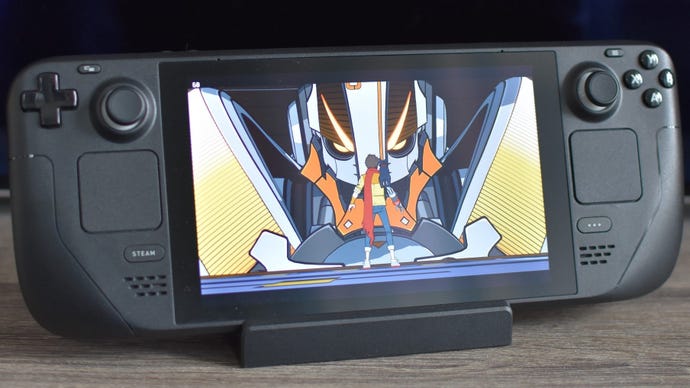
Hi-Fi Rush is the kind of game that plays better on gamepad controls than a mouse and keyboard, so it always had the chance of being a great Steam Deck game. That chance becomes a certainty with its easygoing performance, allowing Medium quality to run at a nearly constant 60fps and High quality to rock n’ roll along at 45fps or more.
I’d happily recommend Tango Gameworks’ surprise rhythm action/hack-and-slash/platformer hybrid regardless of what you play it on: it’s a funny and satisfying brawler with some creative boss fights, and its final act kicks off with one of the single best combat encounters I’ve played in an action game. That it’s more or less a perfect match for the Steam Deck thus makes me one very happy wannabe rockstar indeed.
Ratchet & Clank: Rift Apart
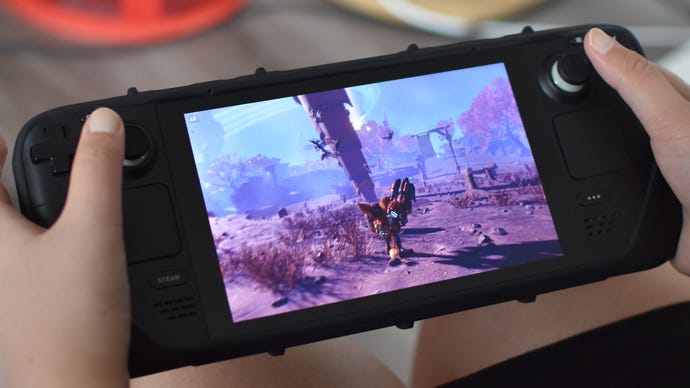
Look at us lucky PC folk – the first R&C game on Steam just happens to be the best one in the entire, two-decades-old series. Ratchet & Clank: Rift Apart is a funny, inventive, intelligently paced shooter-platformer with delightfully mad sci-fi weaponry, from the burrowing rocket launcher to the grenade that turns baddies into topiary sculptures.
On the Deck, it’s best played with the visuals toned down, but it still looks great – and that’s about the only concession required. An official Steam Deck control scheme adapts the former PS5 pad inputs flawlessly, and they’re all highly customisable if you want to make some tweaks.
Stray
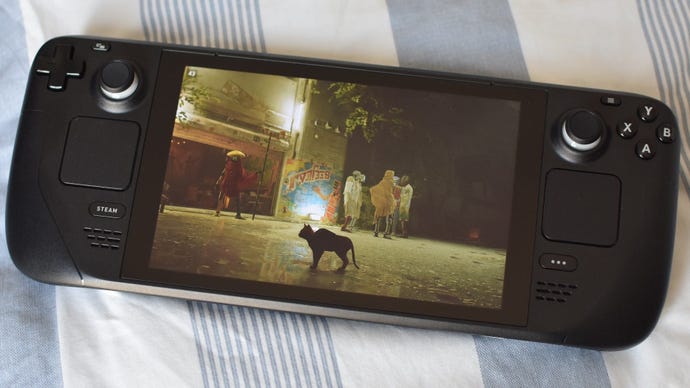
Stray shakes off notions of merely being a haha-funny-cat novelty game with some stellar worldbuilding and intuitive puzzle-platforming, helped along by a sleek context-sensitive traversal style. This translates perfectly to the Steam Deck’s controls, and despite being a bit of a looker, Stray avoids any serious performance issues on the portable hardware. There’s some very occasional stuttering but that’s present on high-end desktop PCs as well, and if you simply lower the Effects quality setting from High to Medium, you shouldn’t drop below 30fps.
Wavetale

Wavetale runs as smoothly on the Steam Deck as your character does on water. An emotive platformer at its core, the greatest joy in Wavetale is catching a ride on your movement-mimicking merperson friend to zip across the rolling ocean. It’s a blast, especially once you also get the hang of chaining together jumps and hookshot moves to navigate the flooded world even faster.
Originally launched for the ill-fated Stadia before finding sanctuary on PC, Wavetale incidentally benefits from the Stadia controller inputs effectively matching the Deck’s, so it feels like it was meant to be here all along. Performance is good too: not quite a solid 60fps, but consistently about 47-50fps.
Elden Ring
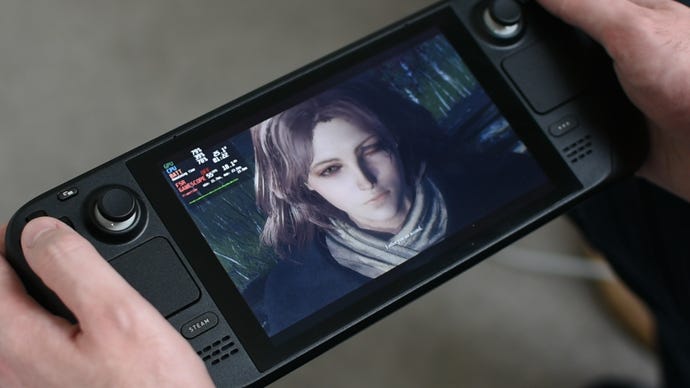
For all of its performance hiccups on Windows, Elden Ring is such a good match for the Steam Deck that it’s earned Verified status from Valve. It’s certainly more comfortable to play and navigate menus with the thumbsticks than to deal with Elden Ring’s wonky mouse and keyboard support, and running on Proton – with its shader pre-caching feature – actually helps smooth out the stuttering that, on Windows, plagues the game to this day.
Smushi Come Home

Smushi Come Home got the surprise launch treatment during Wholesome Direct 2023, and whew, is wholesome the right word. Plucked from his island home, friendly fungi boy Smushi’s return journey is a ranging but almost invariably tranquil one through flowery forests and airy caves. The supporting cast are chill, the acoustic-led soundtrack is delightful, the platforming is gentle… it’s just a nice place to be, y’know? Especially with a mostly free-roaming setup that lets you poke around each new patch of woodland as you please.
The Steam Deck’s hardware limitations also do little to harsh the vibe. Smushi Come Home runs at a consistent 60fps and is probably best played with pad controls anyway, while battery drain is on the slower side. I did find it tricky to read the in-game map at 800p, though there’s always the Steam Deck’s zoom tool, and once I got the lay of the land I rarely needed the cartographic help anyway.
Death’s Door
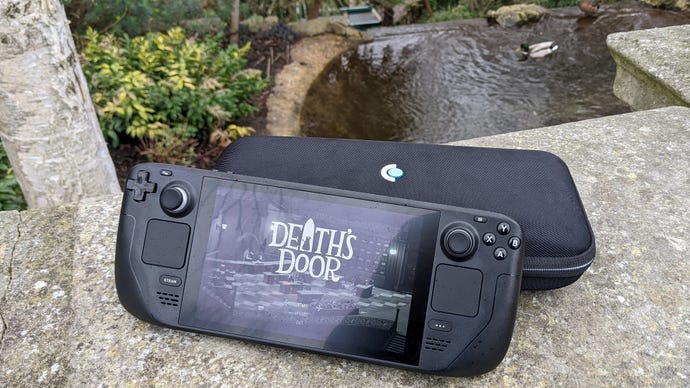
If you’re like me (or Katharine) and don’t have the patience, temperament, or hand-eye coordination for Soulslikes, you may find Death’s Door more palatable. It’s a less demanding, though still challenging, take on “How do I kill this dude no wait I am dead” RPGs that also happens to suit the Steam Deck very comfortably indeed. I actually tried playing it on my desktop after first trying it on the Deck, and quickly abandoned the mouse and keyboard for a return to the handheld’s twin sticks. It’s easy to get a solid 60fps, too.
Forza Horizon 5
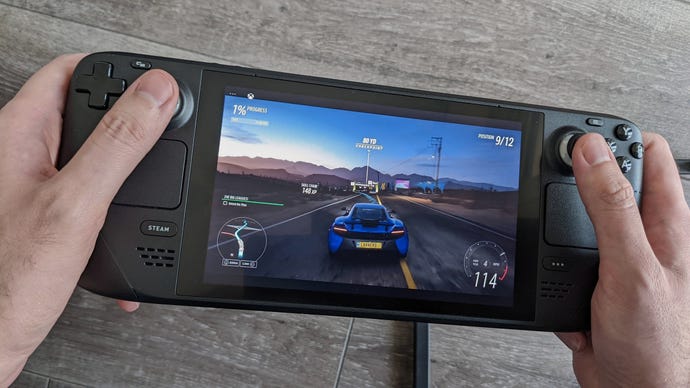
Feel-good racer Forza Horizon 5 is a natural fit for gamepad-style controls, and the Steam Deck’s haptic shoulder buttons even give it a little shake to enhance that feeling of stomping the accelerator. When launching it from Steam I’d suggest lowering the graphics settings to Medium for suitably speedy performance, and if you’re a PC Game Pass Ultimate subscriber you can stream it instead.
Dordogne
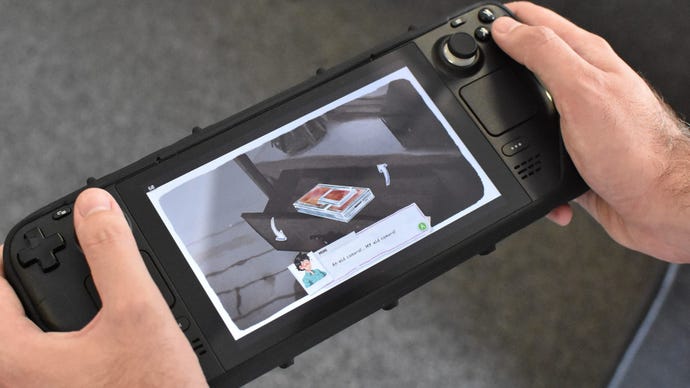
There’s a lot of action on this list. Maybe too much. Let’s all calm down for a moment with Dordogne, a beautifully watercoloured indie adventure that’s as much about appreciating the little things in life as it’s about cherishing the deepest relationships. It trades not in arcane point-and-click puzzling but in simple interactions with everyday objects, adopting a deliberately slow pace while injecting enough thought and character into each interaction to stave off tedium; Dordogne masterfully evokes the trepidation of reading a personal letter, or the joy of finding a long-lost heirloom in a dusty drawer.
Valve have only rated Dordogne as Playable on the Steam Deck, rather than Verified. I think the warning of undersized text is a bit harsh – I haven’t had to zoom in to read anything yet – though it does fail to offer native 1280×800 resolution support. The closest it comes is the 1280×720 option, which in all honesty is fine. What’s 80 vertical pixels between friends?
Portal 2
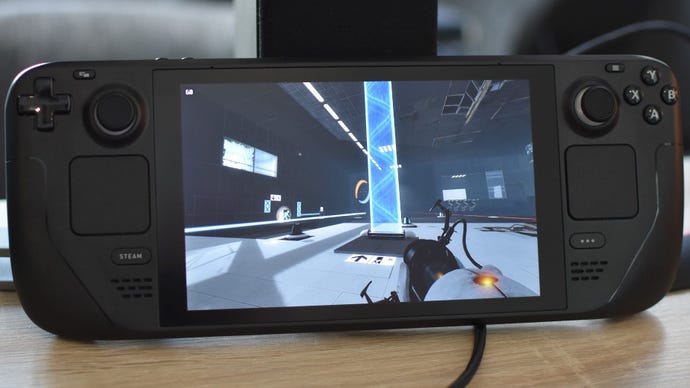
Portal 2 was one of first games Valve showed running on the Steam Deck, and it’s clear why. It runs smoothly, doesn’t need a mouse and keyboard, and is even one of least demanding games I’ve tried in terms of battery life drain – most 3D games tend to quaff a full charge in around two hours, half of the four that Portal 2 took. It’s also a successful showcase of the device’s rear buttons, which let you jump or crouch without taking your portal-aiming thumb off the right stick.
The Entropy Centre
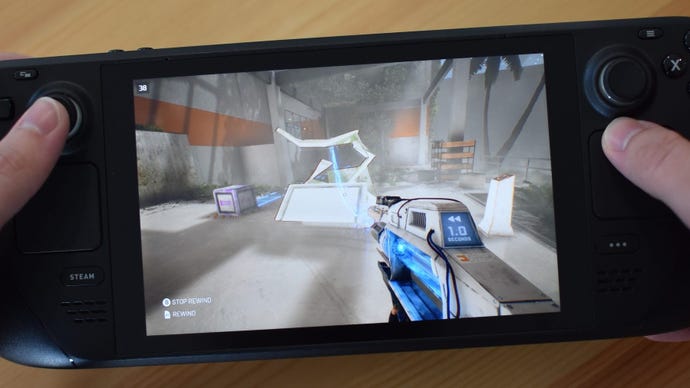
A charming Portal-inspired puzzler where instead of completing brain-bending test chambers for the amusement of a murderous AI, you’re completing brain-bending test chambers to keep the Earth from exploding. Also, instead of portals, your gun fires a time-rewinding beam that scoots objects back along their previous path of movement, or rebuilds ruined stairs and bridges. It makes for some devious puzzle-platforming challenges that you almost have to solve in reverse, as well as some entertaining action sequences based around making desperate repairs to an escape route.
The Steam Deck can run The Entropy Centre reasonably well at Ultra quality, though I found switching to High maintained its polished aesthetic while more consistently staying above 45fps. Its simple control scheme and small installation footprint – less than 12GB – give further credence to its handheld suitability.
The Elder Scrolls V: Skyrim
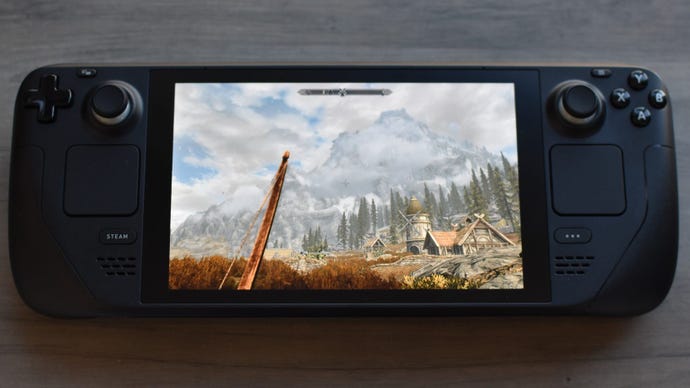
The Steam Deck wouldn’t be a consumer electronics product if it didn’t run The Elder Scrolls V: Skyrim, only this time Todd H. won’t need to sell you a whole new copy. Other than some slight UI awkwardness when trying to type in a new character name, this is the enticingly sprawling Skyrim that we’ve known for years – just explorable on a handheld.
God of War
Dad jokes aside, the relationship-centred narrative and otherworldly beauty of God of War show how much it’s grown up from the series’ edgy early days. Still, the PlayStation link does help make it a natural fit for the Steam Deck’s controller-esque buttons and thumbsticks, and it runs decently on ‘Original’ graphics settings. You can always lower these or switch on its native FSR upscaling if you’d prefer a higher, smoother frame rate.
Ghostwire: Tokyo
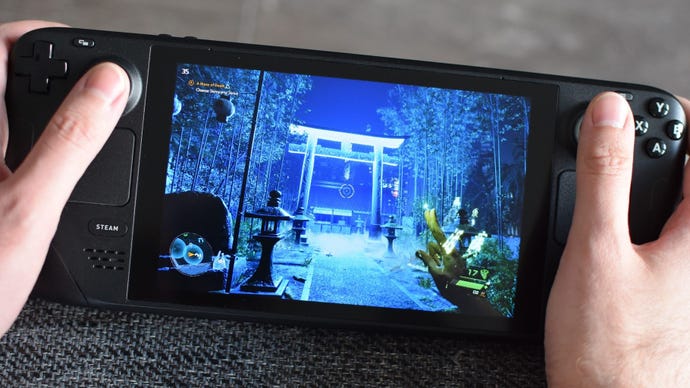
Modern meets mythological in Ghostwire: Tokyo, a gorgeous open-world FPS that quite literally spirits away the population of present-day Shibuya and tasks you with magically biffing the folklore-inspired monsters that did it. This launched in a right old state on the Steam Deck, with broken cutscenes making it impossible to get past the main menu, but after a few patches it’s since won Verified status from Valve themselves.
The catch: it will only run playably on low settings, plus FSR 2, though on the Deck’s small screen this does little to hurt Ghostwire’s impressively atmospheric visuals. It’s a great time to try it, too, now that the Spider’s Thread update has added not just a roguelite side-mode but a bunch of fun new combat powers, stealth tools, and movement abilities to the base game.
Horizon Zero Dawn
Like God of War, Horizon Zero Dawn is a former PlayStation exclusive that makes a seamless transition to the Steam Deck. Hopefully its sequel Horizon Forbidden West is up for a PC port next, as everything in Guerrilla’s original, RPG-tinged open world adventure works nearly perfectly on the Deck’s hardware. Also like God of War, there are higher frame rates to be by lowering the quality settings, though the 40fps-ish you’ll get on the Original preset is agreeable enough.
Monster Hunter Rise
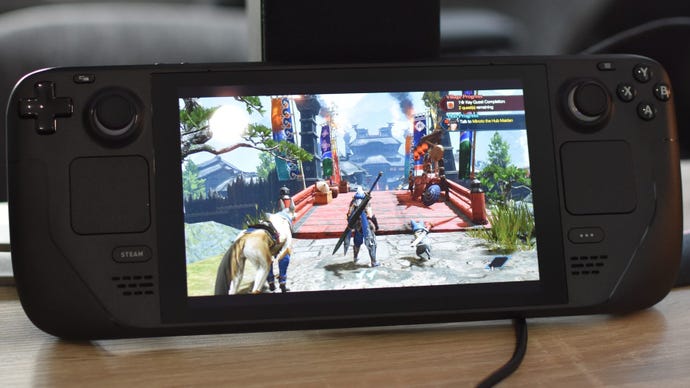
What better PC game to play on a handheld than one originally developed for a handheld? Monster Hunter Rise began life as a Nintendo Switch exclusive before a respectable PC port made it playable on Windows – and thus, the Steam Deck – as well. In places, particularly UI navigation, it often feels more natural to use the Deck’s more Switch-like controls than a keyboard, and the so-so visuals are a lot easier to forgive on a 7in screen than on a 27in, 1400p desktop monitor.
Albion Online
Playable MMOs are in short supply on the Steam Deck, whether it be down to anti-cheat software refusing to shake Proton’s hand or complex controls that just can’t go without a keyboard. Nevertheless, I was impressed by how the free-to-play Albion Online adapts to the Steam Deck’s inputs and screen. One or two button presses can handle a full loadout of items and spells, and if using a trackpad to direct the mouse cursor doesn’t feel quite right, you can just prod the touchscreen instead.
RimWorld
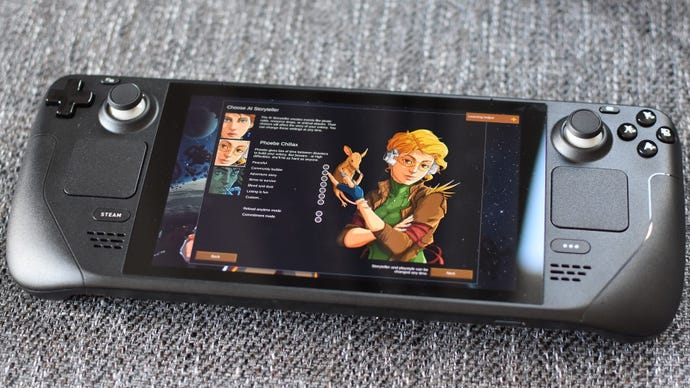
RimWorld is one of very few games – seriously, hardly any – to have been patched specifically to improve how it works on the Steam Deck. That means the interface, an easily overwhelming patchwork of icons, indicators, logs, tabs and other tiny-typefaced elements, remains legible on the 1280×800 screen. You can also zoom in further, and scroll through lists by swiping the touchscreen. All very thoughtful additions that might just help your sandbox base-building efforts end in survival rather than starvation.
Half-Life 2
Valve were so keen on making Half-Life 2 suitable for their portable PC that they went back, early in 2022, to optimise the 2004 shooter’s UI – so it would be more accommodating to a compact touchscreen. Unsurprisingly, it also takes maximum advantage of all the Deck’s bells and whistles, giving you a full choice between thumbstick, trackpad or gyroscope aiming.
Final Fantasy XV
I’ll confess, I’ve spent hours using Final Fantasy XV for hardware benchmarking, but had never sat down to properly play until trying it out on the Steam Deck. And it’s great – the controls adapt perfectly, and Medium video settings deliver fine frame rates without knackering quality. High is playable too, though you’ll be dipping close to 30fps at points.
Super Meat Boy
2D platformers rarely show off the Steam Deck’s upper capabilities, but they’re still an ideal match for the hardware. Thumbstick controls, no real advantage for frame rates above 60fps, low demands on graphics power and battery life? Few genres are as handheld-friendly, as Super Meat Boy capably demonstrates. Then again, maybe I should have picked an easier one – as fast, fun and ultimately rewarding as Super Meat Boy is, its bastard-hardness will require the self-control to resist hurling your handheld into the nearest wall.
Celeste
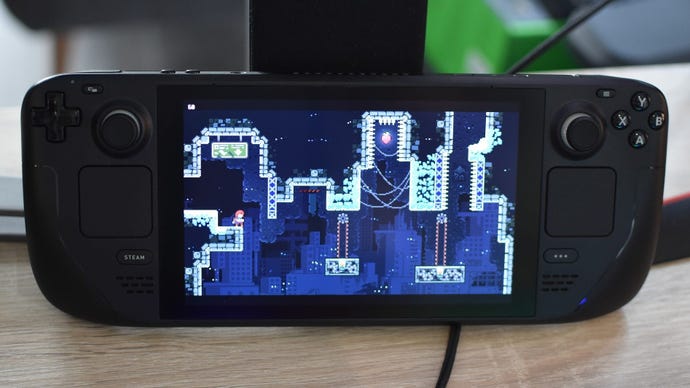
Another top 2D jumper is Celeste. While sharing a wicked fondness for insta-death hazard dodging, it’s not quite the pressure cooker that Super Meat Boy is, and tempers the challenge with a stronger story emphasis and a more considered, melancholy atmosphere. The Steam Deck’s controls are up to the task, too, even if you only need a small selection of them.
Unpacking
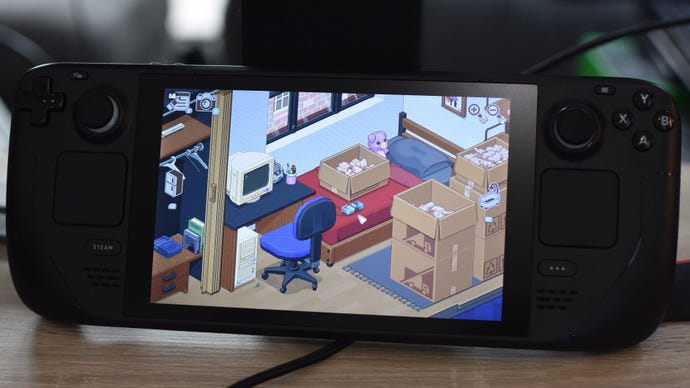
Lovely little life-change sim Unpacking feels, appropriately, right at home on the Steam Deck. If anything, the leisurely pace of its stacking and arranging puzzles is a better fit for those moments of melting into a sofa or lazing around in bed, Deck in hand, than it is for sitting up straight at your PC’s desk. I also love how you can use the touchscreen to drag your lifetime of bric-a-brac around the room, though the left thumbstick works well too.
Kentucky Route Zero
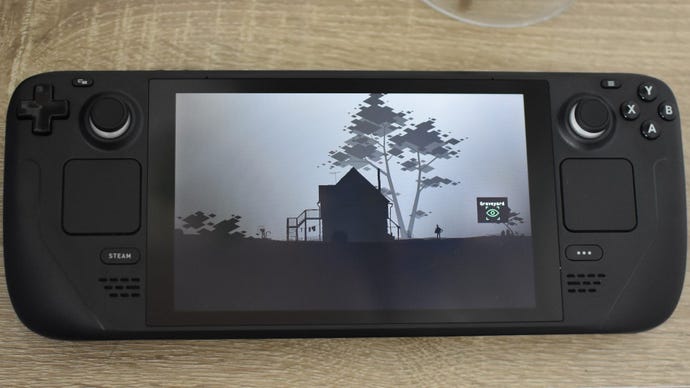
The streamlined point-and-clicking of Kentucky Route Zero helps it settle onto the Steam Deck rather effortlessly. I kinda wish it would use the D-pad to flick through menu options rather than the right thumbstick, but that’s a personal gripe that hardly dulls this game’s best bits: the story’s slow uncovering, the moments of quiet contemplation, and the gorgeous art. All of these are present and current whether you play Kentucky Route Zero on a Steam Deck or a £3000 titan of a desktop.
Outer Wilds
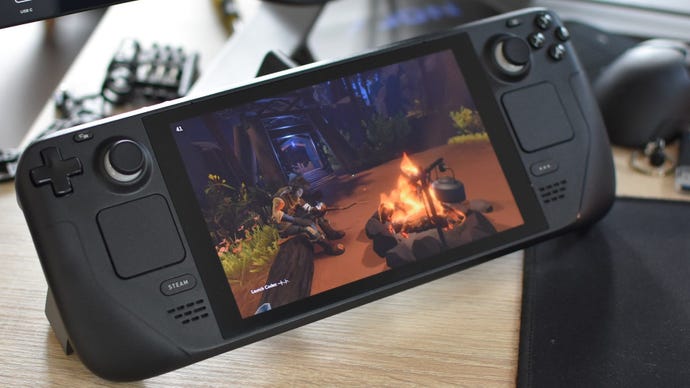
“Outer Wilds is best experienced with a game pad”, says its opening splash. A Steam Deck will suffice as well, allowing you to to enjoy this cute, thoughtful generator of ill-fated space adventures away from your main PC.
Marvel’s Midnight Suns
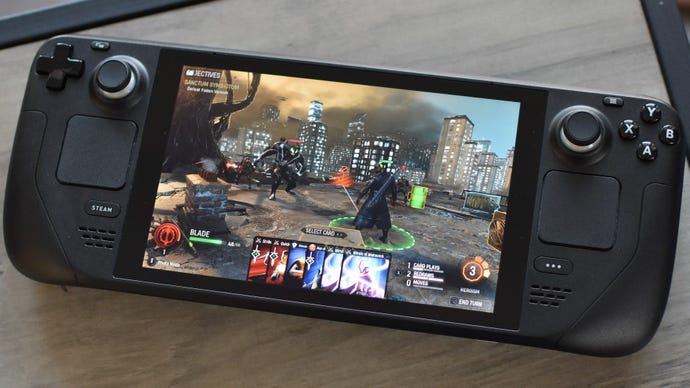
Bestest Best badgewearer Marvel’s Midnight Suns loses none of its charm on the Steam Deck. Firaxis’ card-based superhero RPG leans heavily on the magical side of its source material, while distinguishing itself from most spandex-and-quip adventures by encouraging you to chat with and befriend your team of supes. It’s a game of relationship-building as much as it is of kicking goons through air conditioners.
There’s some performance inconsistency on the Deck, particularly when nosing around your home base hideout, but on default settings it can easily hit 60fps during combat. The slickly-designed UI doesn’t need any special control scheme customisations, either; I liked using the touchscreen to thumb through cards, myself.










